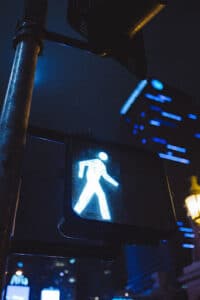
If you’re an injured pedestrian who was harmed while at an intersection or crosswalk, read our blog to learn about your right to recover.
What Must a Pedestrian Prove to Receive Compensation After a Car Accident?
In civil court, you must prove before the finder of fact (i.e., the judge), the defendant is liable for negligence or negligence per se.
To prove negligence occurred, show:
- The defendant owed you a duty of care.
- The defendant breached that duty.
- You sustained injuries.
- The defendant’s breach of duty is the proximate cause of your injuries.
To prove negligence per se occurred, show:
- The defendant violated a traffic law.
- The law was intended to prevent the type of injury that occurred.
What Damages Can a Pedestrian Claim After a Car Accident?
Compensatory Economic Damages
These are your out-of-pocket expenses, such as medical bills or the cost of therapy sessions.
Compensatory Non-economic Damages
These damages pertain to your emotional injuries.
Examples of common non-economic damages following a car accident are:
- Pain and suffering.
- Mental anguish.
- Decrease in quality of life.
Punitive Damages
The court may award punitive damages to punish the defendant for their wanton and reckless behavior. You must prove, by clear and convincing evidence, the defendant intentionally and unjustly harmed you, and did so without displaying any regard for the welfare of others, as pursuant to sect. 510.261. The state caps this award at $500,000 or five times your recovery amount. Also, the judge can deny your request for punitive damages.
Nominal Damages
Nominal damages are damages you request when your injuries are insignificant. You may want to seek nominal damages when the accident has not harmed you financially but you want to make a point in regards to the defendant’s behavior. The judge can award you as little as $1 in nominal damages.
What Is Comparative Negligence?
Pursuant to sect. 537.765, the judge may reduce your award amount in proportion to the role you played in sustaining your injuries. For example, if you’re 20% at fault (e.g., you didn’t have the right-of-way), your award is reduced by 20%. This law does not bar you from seeking recovery as long as you are no more than 99% at fault.
Columbia, MO, Pedestrian Lawyers
For a free consultation at Holden Susan Slusher, LLC, call 573-499-1700.

